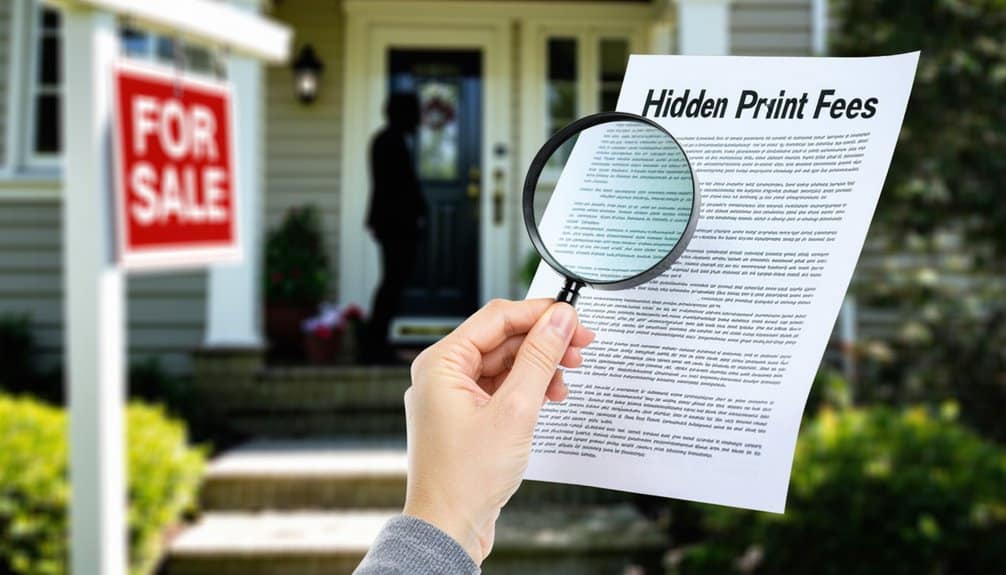
This post was last modified on January 15, 2025.
When you’re maneuvering through the real estate market, it’s important to stay alert for potential fraud. You might encounter red flags like suspiciously low prices or aggressive sales tactics that make you feel rushed. Verify listings and sellers to protect yourself, and don’t overlook the importance of proper documentation. So, what steps should you take to safeguard your interests?
Understanding Real Estate Fraud
Real estate fraud is an alarming issue that affects countless individuals each year. Understanding its various types can help you navigate this complex environment.
Mortgage fraud often involves misrepresentation by borrowers, brokers, or lenders. You might encounter inflated property values, falsified borrower information, or unusual lender fees, all of which threaten mortgage integrity. Be cautious of high-interest rates and a rush to close deals, as these are common red flags.
On the rental side, rental fraud can occur when impostors pose as landlords, collecting deposits for properties they don’t own. They often advertise on rental websites or post fake signs, targeting desperate renters like you. It’s important to perform proper rental verification; never hand over a deposit without seeing the property first.
Watch for duplicated listings or unrealistic prices, as these are indicators of scams. Additionally, verifying a California Real Estate License can help ensure that you’re dealing with a legitimate agent and reduce the risk of fraud.
Identifying Warning Signs
Having a solid grasp of the different types of real estate fraud is just the beginning; recognizing the warning signs is equally important in protecting yourself. One of the first red flag indicators is unusual transaction requests. If you encounter prices far below market value or high-pressure tactics urging you to sign quickly, proceed with caution.
Watch for unconventional payment methods, like wire transfers or cryptocurrencies, which often signal suspicious transactions.
Additionally, scrutinize property listings closely. Fake or duplicate listings and inconsistencies in documentation can point to fraudulent activities. If sellers are unwilling to provide official identification or disclose necessary information, that’s another warning sign.
During property inspections, be wary if sellers refuse in-person visits or if there’s a noticeable discrepancy between the property’s condition and its listing. Poor communication from agents or sellers can also raise red flags, indicating potential fraud.
Finally, verify that professionals you’re working with are licensed and that all documentation is complete and accurate. Legal irregularities, such as unresolved liens or unusual money transfers, should never be overlooked. Understanding market fluctuations can also help you identify potential fraud, as certain schemes may thrive during economic instability.
Staying vigilant about these warning signs can help you steer clear of real estate fraud.
Prevention Strategies
Protecting yourself from real estate fraud requires proactive measures and a strategic approach. Start by strengthening internal controls; implement segregation of duties to guarantee no single individual oversees all financial transactions.
Regular reconciliations of accounts help you spot discrepancies quickly, while multi-layer approval processes add an extra layer of scrutiny for substantial transactions.
Enhancing due diligence is important. Verify seller and property details through official records, and use secure banking channels for transactions. Engaging trusted professionals, such as real estate brokers and lawyers, can provide valuable insights into potential risks.
Utilize technology and AI to your advantage. Advanced algorithms can detect fraud patterns, while automated systems help verify property ownership. Real-time monitoring allows you to spot suspicious activities early.
Finally, conduct regular audits—both internal and external—to assess the effectiveness of your preventative measures. Guarantee compliance with all regulations and include thorough scopes in your audits. Additionally, ensure that your real estate agent understands their fiduciary duties to help protect your interests throughout the transaction.
Analyzing Fraud Statistics
Understanding the prevalence and impact of real estate fraud is key for effective prevention. Recent statistics reveal that certain states bear a heavier burden, with Alabama recording 77 victims suffering an average loss of $69,441, the highest in the nation. South Carolina and Oregon follow, with 130 and 135 victims, respectively. These figures illustrate the significant fraud impact on residents in these areas.
Victim demographics indicate that individuals across various backgrounds can fall prey to such schemes, including the notorious “Buy and Bail” and “Equity Skimming.” In states like Arizona, where 318 victims reported an average loss of $29,787, the risk is particularly high.
Moreover, the financial implications are alarming; North Dakota’s victims average losses of $67,084, highlighting a dangerous trend where fraudsters exploit vulnerable homeowners. Understanding the commission-based nature of real estate transactions can help you identify red flags and avoid potential scams.
Recognizing these patterns empowers you to act cautiously and protect yourself. By analyzing these statistics, you can better understand the terrain of real estate fraud and its effects on victims, providing a foundation for important decision-making in your property transactions.
Always stay vigilant and informed to minimize your risk.
Legal Options for Victims
Legal recourse is critical for victims of real estate fraud seeking to reclaim their losses and restore their rights. You have several remedies available to address the situation.
First, you can pursue rescission of the contract, effectively canceling the transaction and reverting both parties to their pre-deal positions. Monetary damages may also be claimed, compensating you for losses incurred, including reimbursement for expenses and lost profits. In more egregious cases, punitive damages may be awarded to deter future misconduct.
In addition to these remedies, you can seek injunctive relief to prevent further fraudulent actions. If you have title insurance, it can alleviate legal costs associated with ownership claims. Title insurance provides essential protection against potential title defects that could arise after the transaction.
It’s important to engage in fraud reporting by filing a police report, notifying federal agencies like the FTC or HUD, and contacting your state real estate commission.
Consulting a lawyer experienced in real estate law is significant for maneuvering through these options. They can assist you in filing a lawsuit, gathering evidence, and negotiating settlements, ensuring your rights are protected throughout the process.
Frequently Asked Questions
What Should I Do if I Suspect Fraud?
If you suspect fraud, stop all communication immediately. Follow reporting procedures by filing a police report and documenting evidence. Prioritize fraud prevention by notifying relevant authorities, collecting records, and considering legal advice for recovery.
How Can I Verify a Real Estate Agent’s Credentials?
To verify a real estate agent’s credentials, utilize licensing resources for agent verification. Check their license status, professional associations, educational background, and online reputation to guarantee they meet industry standards and ethical practices.
Are Online Property Listings Always Trustworthy?
Online property listings aren’t always trustworthy. You should engage in online listing verification to guarantee accuracy. Watch for fake property alerts, and cross-check details with multiple sources to avoid potential scams and misleading information.
What Are Common Red Flags in Real Estate Transactions?
In real estate transactions, watch for fraudulent listings and misrepresented properties. Red flags include inconsistent documents, pressure tactics, unexpected payment methods, and unresponsive agents, all signaling potential issues that warrant further investigation before proceeding.
How Can Technology Help Prevent Real Estate Fraud?
Technology enhances fraud prevention by implementing property verification systems and digital authentication methods. These tools provide real-time data analysis and secure identity checks, greatly reducing the risk of fraudulent activities in real estate transactions.




